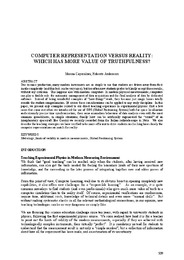Computer representation versus reality: which has more value of truthfulness?

View/
Date
2003Author
Caporaloni, MarinaAmbrosini, Roberto
Publisher
Department of Educational Sciences, University of CyprusPlace of publication
CY - ΛευκωσίαSource
CBLIS Conference Proceedings 2003 Volume I: New Technologies and their applications in educationGoogle Scholar check
Keyword(s):
Metadata
Show full item recordAbstract
Due to mass production, many modern instruments are so simple to use that students are driven away from their inside complexity (and this fact can be very nice); but too often now students prefer to blindly accept those results, without any criticism. This happens also with modern computers. In modern physical measurements, computers can play a double role: the automatic management of data acquisition and the final analysis of data by dedicated software. Instead of being wonderful examples of “how things” work, they become just magic boxes totally outside the student comprehension. Of course these considerations can be applied to any study discipline. In this paper, we present only examples related to our direct teaching experience in experimental physics: first a few cases that came out when we introduced the use of GPS (Global Positioning System) both for space localization and extremely precise time synchronisation; then some anomalous behaviour of data analysis even with the most common spreadsheets, in simple situations; finally how can be artificially regenerated the “sound” of an interplanetary spacecraft like Cassini we recently recorded from the Italian radiotelescope in Noto. We also describe the teaching strategies we have verified to be more efficient to drive students in checking how closely the computer representation can match the reality.
